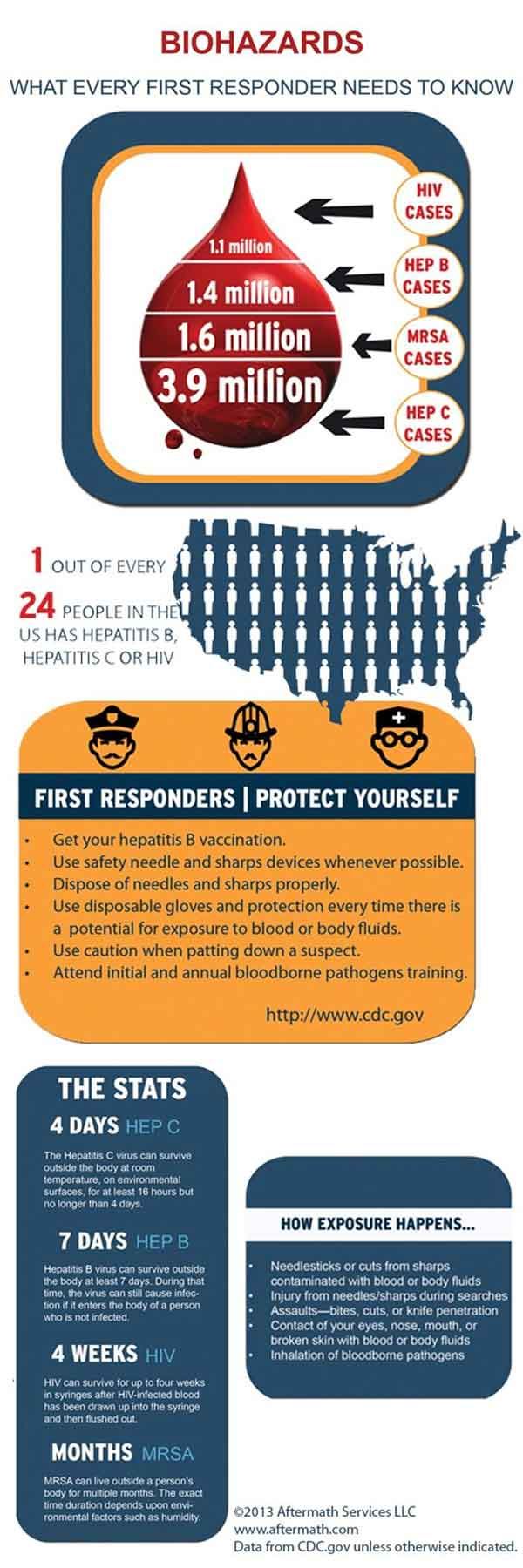Today’s tip is taken, in part, from the “stuff you already know” file. You already know that bad guys — and many of their victims — carry bloodborne pathogens and other germ-like boogeymen in their blood, saliva, and other bodily fluids.
You possibly already know that roughly 12 million Americans have been infected with Hepatitis B, and that more than 1.4 million are chronically infected. Half of those with Hepatitis B are unaware of their infection.
You probably also know that about 75 percent of the estimated 3.2 million people in the United States infected with Hepatitis C — the most common bloodborne pathogen infection in the U.S. — are totally unaware they’re carrying it.
You doubtlessly also know that one out of every 258 people has HIV, and one fifth of the estimated 1.1 million people living with HIV in the United States are unaware of their infection. I’d bet you even know that HIV can survive in a syringe for about a month.
Here’s what you may not know (I sure didn’t):
- The Hep B virus can survive outside the body for a week, and can still cause infection in the body of an otherwise-uninfected person
- The Hep C virus can survive outside the body, at room temperature, on ordinary environmental surfaces, for up to four days (and a minimum of 16 hours)
The impetus for today’s tip is an interesting little “infographic” I received via email from someone who does media relations (read: “PR”) for Aftermath a company “specializing in biohazard remediation” nationwide.
Said differently, Aftermath deals with the gooey mess left over when the cops, firefighters, paramedics, coroners, and crime scene investigators are long gone.
As the above information suggests, the nastiness of infected bodily fluids left behind at a scene remains a serious risk for quite a long time.
Your Gloves, Your Safey
It’s a safe bet to say that you “glove up” to handle many of subjects you encounter in a given shift. But what about a countertop?
We don’t have to worry just about the people we touch, but also the things.
Think about the scene of a domestic. You’ve separated the combatants, and things have settled down — perhaps you’ve got one or both of the subjects hooked up and sitting in the back of a squad.
You take off your gloves and toss them into a waste basket. You put your notebook on the kitchen counter and write jot down some notes for your report. What was on that counter? Is it now on your notebook? Or worse, your hands?
Think about when you removed your gloves. Did you just handle a potentially infected left glove with a bare right hand (or vice versa)? Did you do the unthinkable and — without thinking! — just peel one of those gloves off with your teeth?
We know those things happen. We also know that bad results have followed.
Talk with your EMTs and/or paramedics about their procedures to protect against blood-borne pathogens. If you’ve never had occasion to do so, I suggest also that you check out EMS1.com — sort of a P1 for Paramedics and EMTs — which has abundant resources available to you as well.
Check out the information in the graphic below and/or get access to additional resources available from Aftermath. Share what you learn with your fellow officers in the squad room.
Above all else, stay safe out there.













